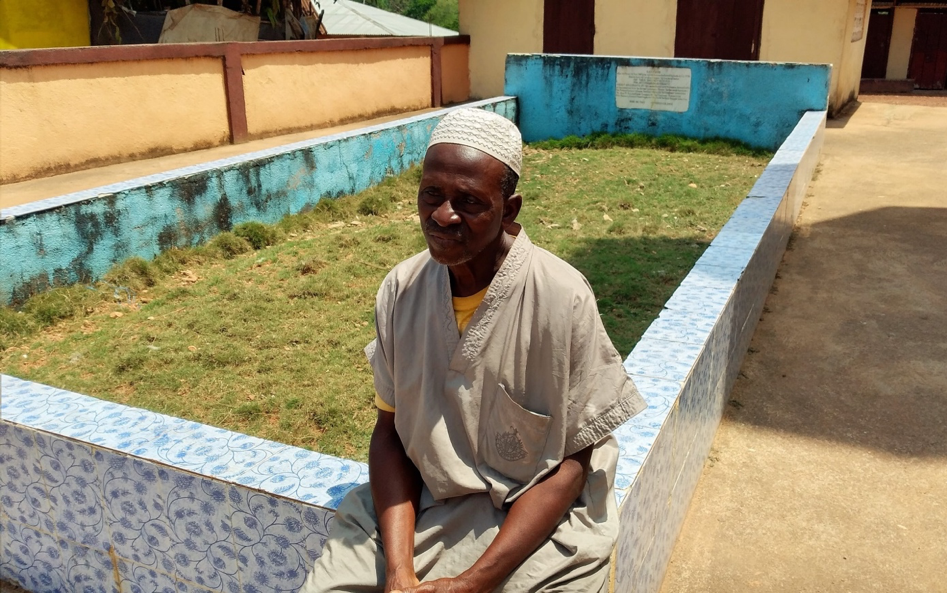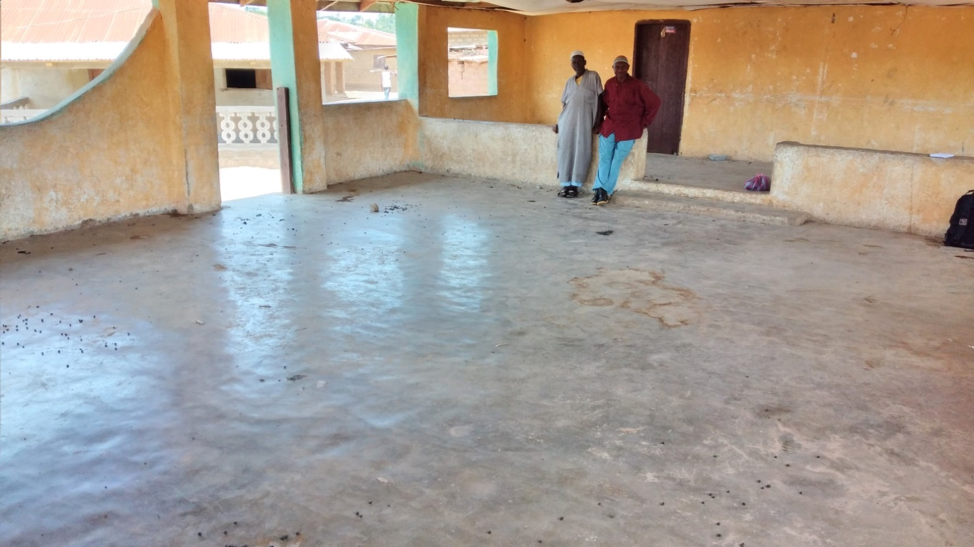
BARKEDU, Lofa County – The convictions of Alieu Kosiah and Mohammed Jabateh for war crimes committed in Liberia sparked celebrations across Liberia. 18 years since the war ended survivors saw them as long overdue justice for the horrors of the civil war. But Liberia’s Mandingo population has not felt the same way.
“There are other people in this country like Prince Johnson taking governmental positions are not targeted,” said J. Sumawolo Kante, 41, Commissioner of Barkedu township, a predominantly Mandingo town in Lofa County. He pointed to the former warlord-turned-senator Prince Johnson who is listed as one of the “worst perpetrators” in Liberia’s Truth and Reconciliation Report. “I don’t like to see my kinsmen going for trial while others are seated.”
Three of the nine cases brought against combatants in Liberia’s civil wars since 2017 have been Ulimo, the rebel group made up predominantly of Mandingoes that formed after Charles Taylor’s National Patriotic Front for Liberia launched its rebellion against the government of President Samuel Doe in December 1989. Of the three convictions so far, two have been Ulimo. The high-profile nature of those convictions – Mohammed Jabateh alias “Jungle Jabbeh” in the United States in 2017 and Alieu Kosiah in Switzerland this month – have some Mandingoes saying they are being singled out.
But while it is true that more Ulimo combatants have been convicted, more of Taylor’s allies have been charged.
Taylor’s number two lieutenant Thomas Woewiyu was convicted of criminal immigration fraud in the United States in 2018 in relation to his war crimes. Taylor allies Agnes Reeves Taylor and Martina Johnson were charged with war crimes (Taylor’s case in the UK was dismissed on a technicality in 2020). Gibril Massaquoi, the former Revolutionary United Front (RUF) commander and Taylor ally, is currently on trial in Finland.

The cases have all been brought under the principle of international jurisdiction which says that a perpetrator who commits crimes against humanity can be prosecuted anywhere.
Hassan Bility, the head of Global Justice Research Project which has helped international prosecutors build all the cases, is a Mandingo himself. He is also a survivor of torture at the hands of Taylor’s lieutenants. He dismisses the claims.
“It is ridiculous. This is not about Mandingoes. This doesn’t make any sense,” Mr. Bility said. “Basically, we do not target people. The minimum time we spend on an investigation before any case is two years plus. We are very clean people who conduct impartial investigations that meet international standards.”
Mr. Bility said Mandingo anger is being fueled by people with bad motives.
“They want to stand in the way of justice.”
Nonetheless, people of the Mandingo tribe have a long painful history as targets of discrimination and violence in Liberia. They claim the trials have rekindled hostility among other groups.
“People participated in the war not because they wanted to. Some were forced to do it. Some joined to see their people free from exile to come,” he said. “Why should we the Mandingos be targeted? You can’t travel any more once you know that you participated in the past wars. They are after us.”
Nowhere is that sentiment felt more strongly than here in Barkedu.
Barkedu Massacre
On July 12, 1990, fighters of Taylor’s NPFL stormed Barkedu Town armed with guns and other deadly weapons. It was six months after Taylor launched his invasion from Ivory Coast. The NPFL had overrun much of Liberia before breakaway leader Prince Johnson formed his own rebel group and killed President Samuel Doe.
That day in Barkedu, the rebels at first cajoled citizens to hold a meeting. The town chief and residents crowded into the town hall with smiles and excitement planning to receive the rebels and present them with gifts.
But their high hopes turned into a nightmare.
“We went to welcome them but when we get to the town hall, there was no meeting,” recalled Abu M. Ballo, one of the villagers, now 70-years-old. “They told us that people told them Mandingo people are living here and they were going to kill us.”
Barkedu Town is the most populated town in Quardu-Gbonii-which is predominantly Mandingo (99%) and are all Maliki Muslims.
Abu Lassana Ballo, 67, the younger brother of Abu M. Ballo, was also there.
“I came and saw my brother trembling and the rebels asked me to sit down too, Lassana said. “I saw them bringing plenty people to join us. By that time, there was gun sound all over the town. One of them took the RPG and said he wants to spoil the mosque.”
The NPFL rebels demanded gifts from the town. Lassana’s father was the treasurer so Lassana handed over village savings of LD$3000, one bag of rice and a cow. The small amount angered the commander. The rebels ordered women and children to leave the hall.
“The commander told us that from the day God created us up to this time, we know that you people are our enemies,” recalled Lassana. “He counted from one to four and the people started firing for more than 30 minutes.”
The NPFL rebels killed more than 200 people in what came to be known as the Barkedu Massacre.

“People heads were bursting and scattering all over. All the walls and roof were burst,” Lassana recalled. “The people that were in front were the ones they killed and the people behind fell down on their own to pretend that they already die. The bullet touched me and so, I was just lying down thinking I was dead.”

Abu survived the massacre after he was shot and dropped among the dead bodies in the hall. He now carries scars on his left thigh and fingers. He has no doubt why they were attacked.
“We had Kpelle, Gbandi and other people here,” he said. “But only Mandingo people were killed. Even one man was Kpelle man here in the town hall. They asked him for his tribe and allowed him to go”.
The Massacre Gives Birth to ULIMO
The bloodbath in Barkedu and other areas in Lofa drove thousands across the border to Guinea. In exile they created ULIMO and a determination to win back their land and protect fellow kinsmen.
“That was the reason ULIMO was formed because of the way their parents were killed,” said Abu. “When they came here, they started to protect their own of people.”
When ULIMO crossed back into Liberia they laid a trail of destruction themselves under leadership that included Kosiah, Jabbateh and Kunti K, who will face trial for war crimes in France next year. The Truth and Reconciliation Commission Report found Ulimo responsible for seven percent of all the human rights violations reported to it including killing, raping, enslavement and displacement. The Mandingo suffered about 4.9% of the total violations reported to the TRC. By contrast, Taylor’s forces committed 41 percent of violations recorded by the TRC, the highest number of any faction.
To many, Mandingoes Ulimo’s actions were justified. They say the rebel group was the only thing that stopped the NPFL forces that were intent on wiping them out.
Trials of ULIMO’s Jungle Jabbah and Alieu Kosiah were covered extensively in Liberia’s media. Both men received lengthy sentences. The only other Liberian convicted over war crimes in Liberia was Thomas Woewiyu, Charles Taylor’s number two, who died of Covid-19 in the United States in 2020 while he was awaiting sentencing. The Barkedu massacre played a heavy role in Woewiyu’s conviction. Survivors travelled to the trial in Philadelphia in 2018 to testify about the massacre and the horrors suffered by the people at Barkedu. The jury held Woewiyu responsible.
Justified or not, the high-profile nature of the Jabbateh and Kosiah convictions has combined with the Mandingos long standing resentment to create a perception that their kinsmen are being unfairly targeted in these trials.
“I don’t know the reason they are arresting them because, there were lots of tribes that were involved in the fighting (war) and majority of the people they are arresting were not those who started the war here,” said Abu. “After the war and massacre, we made big sacrifice and said everything finished.”

“For us, we are Muslims. We know that the massacre that took place – if God couldn’t have agreed, it was not going to take place,” said Lassana.
“Whatsoever that passed here or happened, that’s God will and we forget about everything.”
J. Sumawolo Kante, Commissioner of Barkedu Township, lost his oldest brother, who was the breadwinner of the family, during the massacre. He echoes Lassana’s anger.
“ULIMO was made up of different tribes: Lorma, Mandingo, Vai, and Krahn were there. And so, I am just confused for Mandingos to be facing prosecution,” Mr. Kante said.
Mr. Bility formed GJRP in 2012 after then-president Ellen Johnson Sirleaf rejected the TRC’s recommendation that the country hold a war and economic crimes court. In partnership with Civitas Maxima, the Geneva-based non-profit, and the Center for Justice and Accountability in the U.S., he has documented crimes against combatants in Liberia, tracked them down in exile and helped investigators in European and US jurisdictions bring cases against them.
Mr. Bility claimed that “misguided individuals” who are envious of the workings of his group are the ones paying for false stories in Liberian news media and spreading the falsehood that only Mandingo are being targeted for prosecution.
“We are aware that they’ve said that only Mandingo people are being arrested but that is not true,” Mr. Bility said. “Mr. Woewiyu was not a Mandingo, Martina Johnson and other people were not.”
“People who committed international crimes – because war crimes are international crimes – can be arrested, investigated and hopefully prosecuted even in any country around the world”.
Mr. Bility said GJRP will continue to investigate war crimes and crimes against humanity involving anyone and submit its evidence to judicial authorities in other countries to conduct their own independent investigations and ensure the prosecution of these individuals regardless of tribe or affiliation.
Mandingo leaders in Barkedu will hold him to that promise.
This story was a collaboration with New Narratives as part of the West Africa Justice Reporting Project.
